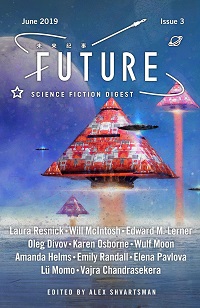 Future Science Fiction Digest #3, June 2019
Future Science Fiction Digest #3, June 2019
“Cratered” by Karen Osborne
Reviewed by Victoria Silverwolf
In honor of the fiftieth anniversary of the first manned lunar landing, the latest issue of this magazine of international science fiction offers several stories about the Moon. As a second theme, many stories feature artificial intelligences as protagonists.
“Cratered” by Karen Osborne begins with a woman seeing a fireplace, identical to the one in her destroyed home on Earth, on the surface of the Moon. Her fellow astronaut also sees a fireplace, but a different one, resembling a childhood memory. Not long afterwards, the woman encounters the image of her lover, killed in a terrorist attack. The explanation for this mystery involves hidden technology, and the way in which human beings yearn for the things they have lost.
The author conveys a powerful message about letting go of the past, no matter how painful this may be. The behavior of some of the characters may be difficult to accept, as they risk death in pursuit of illusions.
“Astrobody for Sale or Rent” by Laura Resnick is a satiric comedy spoofing the current President of the United States. (Although the character is unnamed, the intention is clear.) After appointing unqualified persons to head NASA and slashing its budget, he proclaims that he will land the first human being on the Moon. (He dismisses former Moon missions as “fake news.”) The plot eventually evolves into a parody of reality television. Whatever readers’ political leanings may be, they are likely to find this story on the silly side.
“Americans on the Moon” by Oleg Divov, translated from Russian by editor Alex Shvartsman, takes place in an alternate version of the year 1980. The United States has a military base on the Moon, which they imagine to be safe from attack. The unexpected arrival of a Soviet moon buggy, equipped with a nuclear device, changes the balance of power.
This sideways version of the Cold War era exposes the folly of each side thinking they can win an advantage over the other. How the Americans react to the threat provides a thoughtful look at the ways things might have happened.
The narrator of “The Satellites of Damocles” by Edward M. Lerner is a supercomputer. A government agent contacts it to solve a mystery involving vital handwritten notes, stolen from a room thought to be completely secure. Despite the science fiction themes, this is really a traditional detective story. (The computer even takes on the persona of Sherlock Holmes.) Fans of locked room mysteries may enjoy it, although the story is too long to sustain interest in a relatively simple plot.
“Love, Death, and Printed Burgers” by Amanda Helms also features an artificial intelligence, but of a more modest kind. The AI is a sentient food truck, preparing meals for its customers via a sophisticated 3-D printer. It adopts a pet dog when the animal’s master dies. The dog becomes ill itself, and the AI takes desperate measures to save its life. The outcome of this sentimental tale may be predictable, but animal lovers will appreciate it.
Yet another AI serves as the narrator of “Warden’s Dilemma” by Emily Randall. It guards human and alien convicts on a desolate prison planet. A starship arrives, carrying not only the usual criminals, but also an alien child, born and orphaned during the long voyage. The AI has to deal with the innocent child, while plotting a way to escape its unwanted job. The relationship between the AI and the child is enjoyable, even if the plot depends on an unlikely coincidence.
“Love in the Time of Con Crud” by Elena Pavlova, translated from Bulgarian by the author and Kalin M. Nenov, takes place at the 2017 World Science Fiction Convention, held in Helsinki, Finland. Time travelers from the future journey to the convention, in order to prevent a plague from raging through Europe and paving the way for two devastating wars. The theme of changing the past is a familiar one. Obviously, this story will have a special meaning for those who attended the convention.
“Foot Ball” by Will McIntosh begins with what seems to be an ordinary game of soccer. We soon learn that the stakes are very high; the loser will be the winner’s slave for life. Complicating matters is a nearby forest into which no one dares go, fearing the monsters thought to dwell therein. The protagonist, desperate to win the game, carries the ball into the forest and learns its strange secrets.
Although the beings in the forest have a scientific explanation, the first part of this story reads like supernatural horror. The setting turns out to be a post-apocalyptic future, and is not entirely original.
“Waking in the Cold and the Dark” by Lü Momo, translated from Chinese by Nathan Faries, features another AI narrator. This one is in control of a starship filled with passengers in suspended animation. Although it cannot directly harm human beings, disobey them, or lie to them, it manipulates conditions so that two of the frozen people die upon awakening. It wakes a third, intending to have him die as well. What follows is a cat and mouse game between man and computer, with the ruthlessly logical machine working within its limitations in pursuit of its own secret goals.
Reminiscent of classic tales by writers such as Asimov and Clarke, this is a clever story with many twists and turns. The plot requires a great deal of expository dialogue between the only two active characters, lessening its impact.
“Apologia” by Vajra Chandrasekera is a brief story about a poet sent through time to create apologetic poems about the tragedies of the past. This mood piece has no real plot beyond its basic concept, but the end provides a welcome touch of irony.
Victoria Silverwolf would like to point out that this issue also contains an interview with D. C. Fontana.